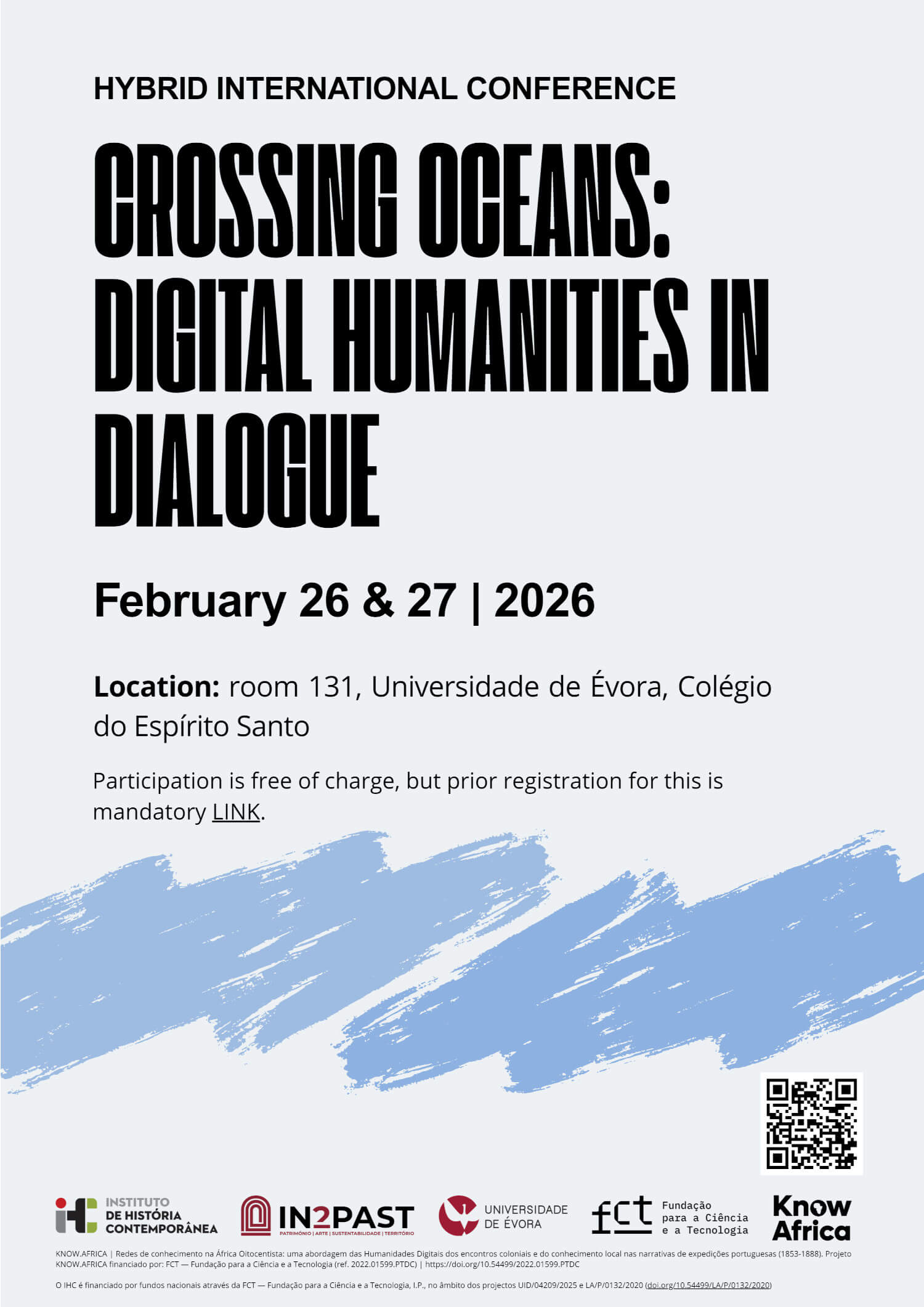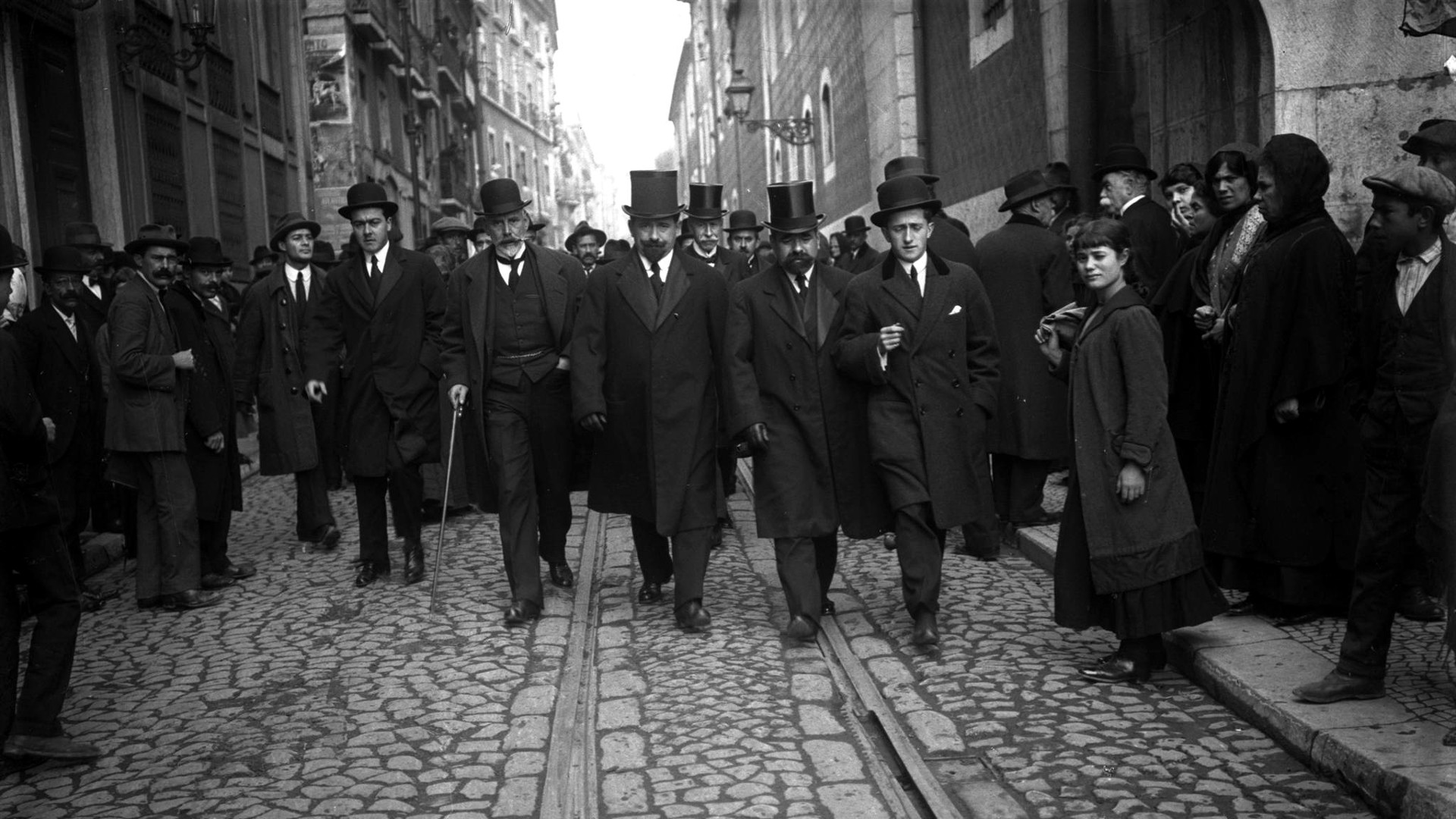
Chamada aberta para a Revista de História das Ideias: Culturas do Fogo
Prazo: 30 Setembro 2026
A História está na Escola! — Novo programa educativo do IHC
Programa pretende familiarizar estudantes com a pesquisa histórica e as suas ferramentas
Chamada aberta para a Aniki: Novos desafios da interatividade na criação narrativa
Prazo: 15 Fevereiro 2026
O Governo de Todos Nós: IHC lança desafio às autarquias
O Governo de Todos Nós. 50 Anos de Poder Local Democrático (1976-2026)
Notícias
-
 Após eleições a 15 de Dezembro de 2025, tomaram posse os novos órgão sociais para o mandato 2026-2028
Após eleições a 15 de Dezembro de 2025, tomaram posse os novos órgão sociais para o mandato 2026-2028 -
 Candidaturas a decorrer até ao dia 16 de Fevereiro
Candidaturas a decorrer até ao dia 16 de Fevereiro -
 Vai tomar posse como como Académica de Número
Vai tomar posse como como Académica de Número -
 A cidade beirã aderiu ao desafio lançado pelo IHC em Novembro do ano passado
A cidade beirã aderiu ao desafio lançado pelo IHC em Novembro do ano passado -
 Esforço desenvolvido pelo IHC para a consolidação de carreiras científicas
Esforço desenvolvido pelo IHC para a consolidação de carreiras científicas -
 Destacado historiador social e cultural da Universidade de Oxford
Destacado historiador social e cultural da Universidade de Oxford -
 Ciclo de cinema em torno das relações entre a sua obra e esta forma de arte
Ciclo de cinema em torno das relações entre a sua obra e esta forma de arte -
 Suplemento especial da revista História, Ciências, Saúde — Manguinhos
Suplemento especial da revista História, Ciências, Saúde — Manguinhos -
 Prémio atribuído conjuntamente pelo IHC e Padrão dos Descobrimentos / Lisboa Cultura
Prémio atribuído conjuntamente pelo IHC e Padrão dos Descobrimentos / Lisboa Cultura -
 O IHC é uma das entidades participantes no Transatlantic Crossroads Lab
O IHC é uma das entidades participantes no Transatlantic Crossroads Lab -
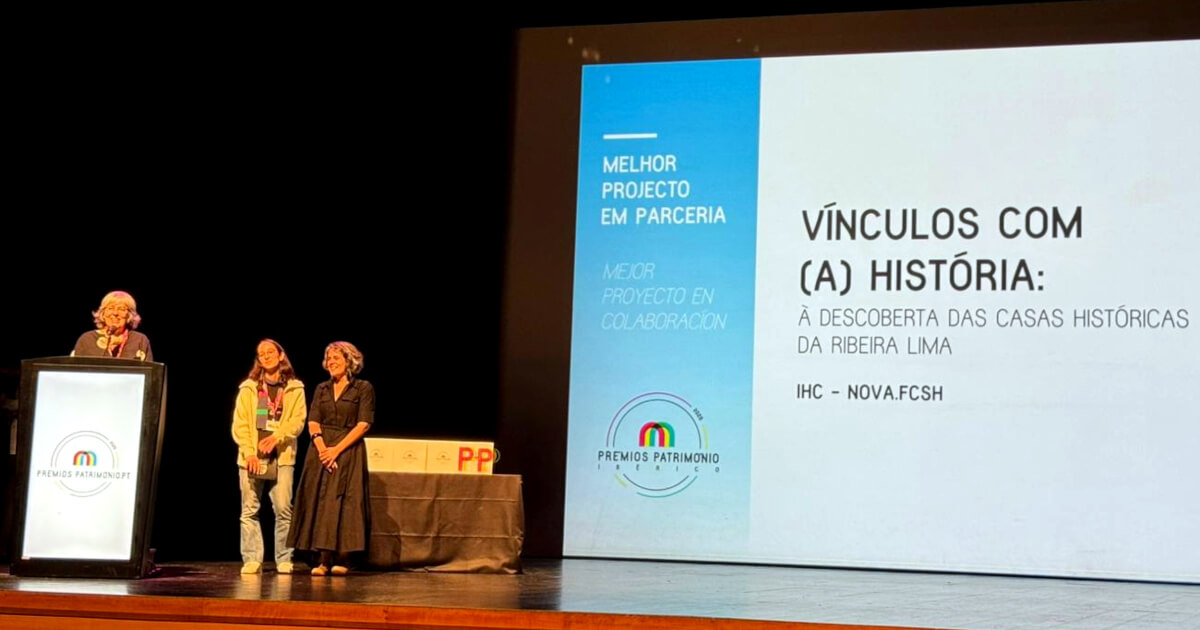 Foi a vencedora do Melhor Projecto de Parceria
Foi a vencedora do Melhor Projecto de Parceria -
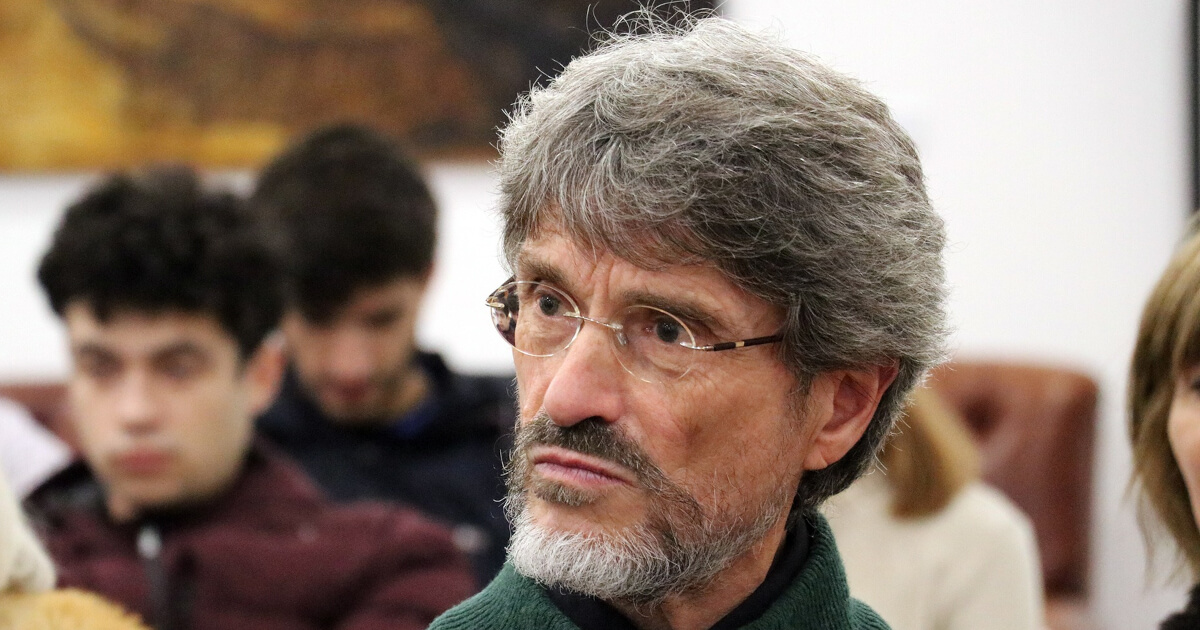 A sessão comemorativa assinalou a sua aposentação
A sessão comemorativa assinalou a sua aposentação -
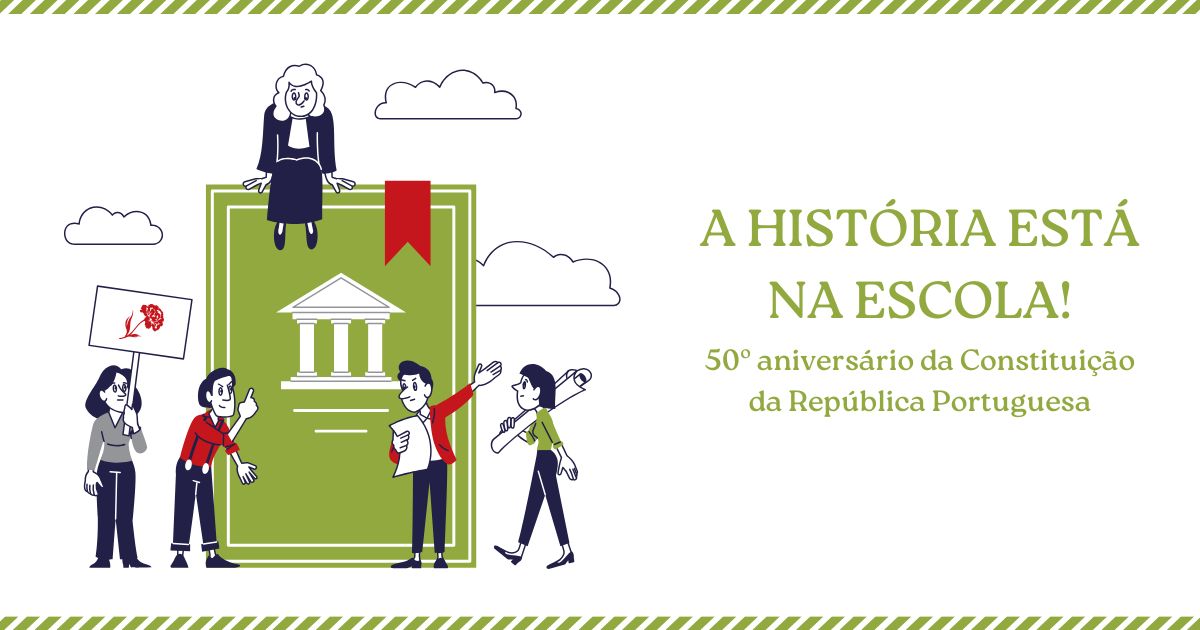 Programa pretende familiarizar estudantes com a pesquisa histórica e as suas ferramentas
Programa pretende familiarizar estudantes com a pesquisa histórica e as suas ferramentas -
 Recebeu três prémios no festival Caminhos do Cinema Português
Recebeu três prémios no festival Caminhos do Cinema Português -
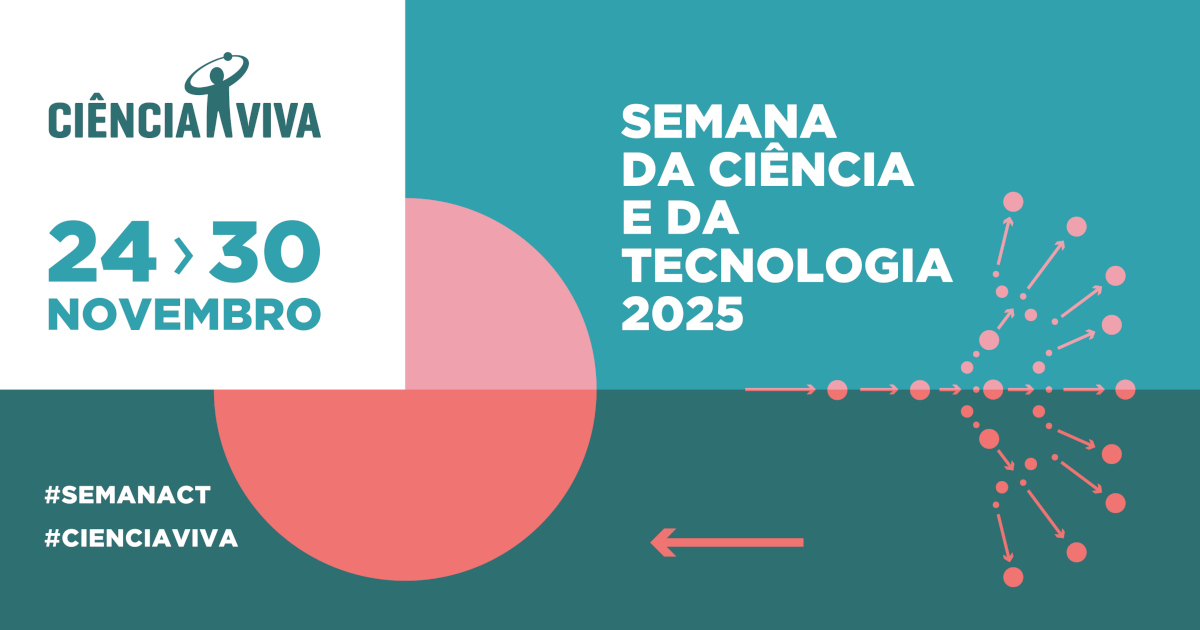 As duas actividades propostas pelo IHC concentram-se no dia 25 de Novembro.
As duas actividades propostas pelo IHC concentram-se no dia 25 de Novembro. -
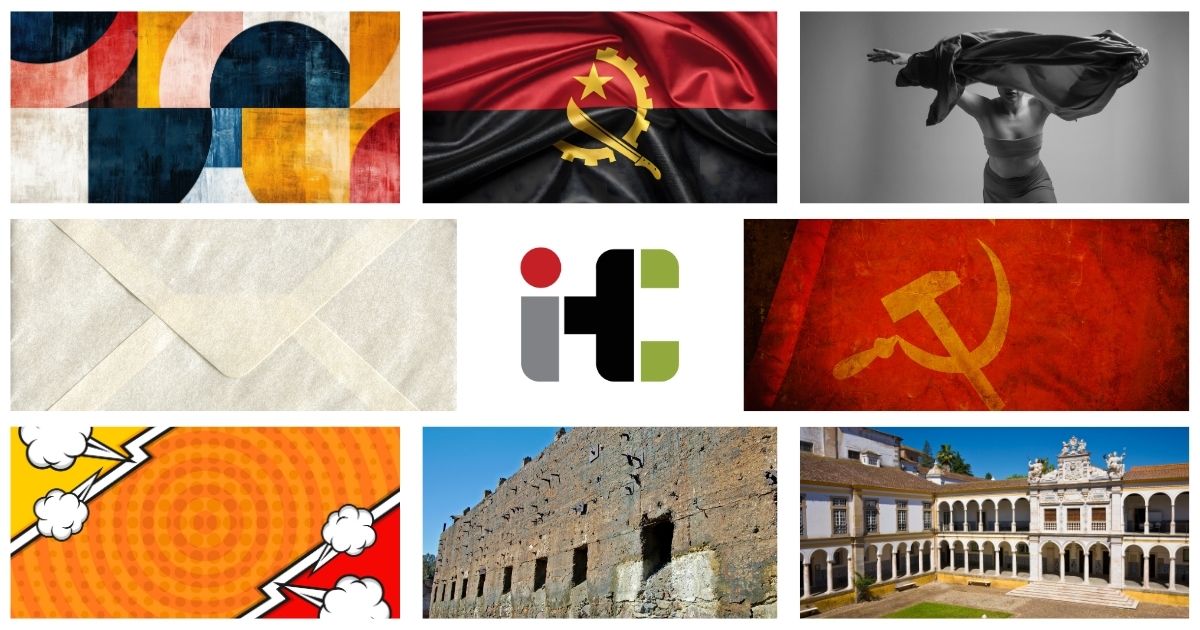 O IHC apoiou candidaturas a quatro concursos de Bolsas de Investigação para Doutoramento diferentes
O IHC apoiou candidaturas a quatro concursos de Bolsas de Investigação para Doutoramento diferentes -
 Isabel Baltazar foi galardoada nos International Educational Awards
Isabel Baltazar foi galardoada nos International Educational Awards -
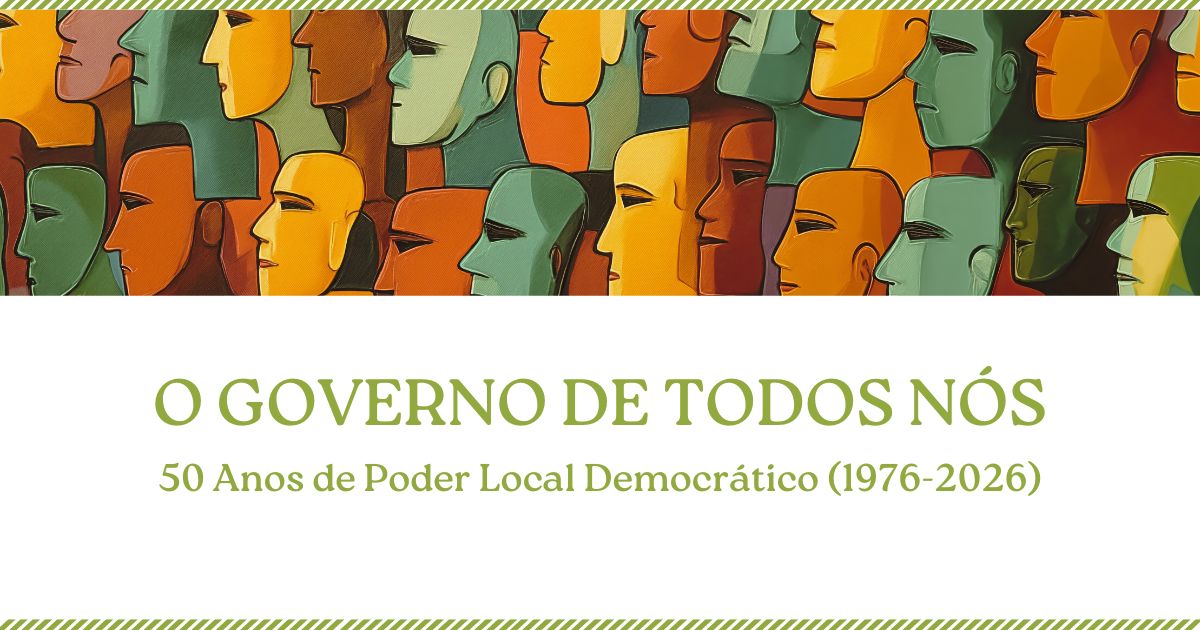 O Governo de Todos Nós. 50 Anos de Poder Local Democrático (1976-2026)
O Governo de Todos Nós. 50 Anos de Poder Local Democrático (1976-2026) -
 “Vínculos com (a) História: à descoberta das casas históricas da Ribeira Lima” foi a iniciativa nomeada
“Vínculos com (a) História: à descoberta das casas históricas da Ribeira Lima” foi a iniciativa nomeada -
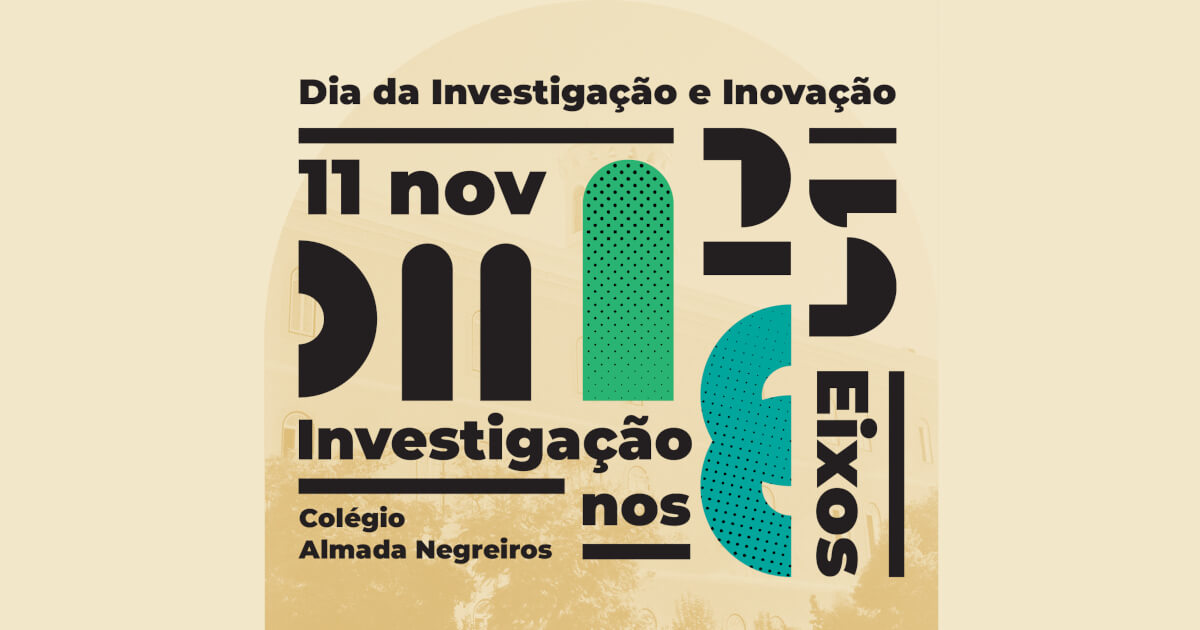 A FCSH vai celebrar o Dia da Investigação e Inovação com o tema "Investigação nos Eixos"
A FCSH vai celebrar o Dia da Investigação e Inovação com o tema "Investigação nos Eixos"
Agenda
fevereiro, 2026
Tipologia do Evento:
Todos
Todos
Apresentação
Ciclo
Colóquio
Conferência
Congresso
Curso
Debate
Encontro
Exposição
Inauguração
Jornadas
Lançamento
Mesa-redonda
Mostra
Open calls
Outros
Palestra
Roteiro
Seminário
Sessão de cinema
Simpósio
Workshop

Detalhes do Evento
Sessão de encerramento do projecto VINCULUM, que inclui a estreia de um documentário e a apresentação de um novo programa de comunicação de ciência. Sessão de encerramento do VINCULUM O
Ver mais
Detalhes do Evento
Sessão de encerramento do projecto VINCULUM, que inclui a estreia de um documentário e a apresentação de um novo programa de comunicação de ciência.
Sessão de encerramento do VINCULUM
O projecto VINCULUM vai terminar com uma sessão de encerramento que terá lugar na NOVA FCSH no dia 23 de Fevereiro de 2026, pelas 15h.
Nesta sessão, serão oradores Vítor Cardoso (Instituto Superior Técnico) e Henrique Leitão (Faculdade de Ciências da Universidade de Lisboa).
Além destas intervenções, terá lugar a estreia do documentário VINCULUM: um caminho de investigação científica / a journey of scientific research, e será apresentado o programa de comunicação de ciência Manter Vínculos com a História: Passados Longos para um Presente Consciente, a desenvolver a partir de 2026, no IHC.
Estarão presentes o Reitor da Universidade NOVA de Lisboa, Paulo Pereira, Directora da Faculdade de Ciências Sociais e Humanas, Alexandra Curvelo.
Solicita-se confirmação de presença, até dia 19 de Fevereiro, para o mail vinculum@fcsh.unl.pt
🔗 Quem não puder estar presente, poderá acompanhar a sessão via Zoom, neste link.
Tempo
(Segunda-feira) 3:00 pm - 6:00 pm
Organizador
Instituto de História Contemporânea — Faculdade de Ciências Sociais e Humanas da Universidade NOVA de Lisboacomunicacao.ihc@fcsh.unl.pt Avenida de Berna, 26C — 1069-061 Lisboa

Detalhes do Evento
Sessão do seminário permanente "Revisitar o Século XIX", que procura recuperar a centralidade dos estudos sobre o chamado "Longo Século XIX". Alturas e desigualdade: desigualdade social e económica em
Ver mais
Detalhes do Evento
Sessão do seminário permanente “Revisitar o Século XIX”, que procura recuperar a centralidade dos estudos sobre o chamado “Longo Século XIX”.
Alturas e desigualdade: desigualdade social e económica em Portugal antes da industrialização
Carlos Manuel Faísca (Universidade de Coimbra, CEIS20)
Esta comunicação analisa os níveis de vida biológicos no sul de Portugal no final do Antigo Regime, com base no estudo de mais de 1500 soldados do Regimento de Infantaria de Tavira, nascidos entre 1730 e 1786. Através da comparação das estaturas segundo a origem geográfica e o enquadramento social, identificam-se diferenças relevantes, nomeadamente um “prémio urbano”, com indivíduos criados em meios urbanos a apresentarem maior estatura do que os provenientes de áreas rurais, não se observando, contudo, diferenças significativas entre populações do litoral e do interior. Os resultados evidenciam igualmente fortes desigualdades sociais, com oficiais e filhos de famílias de estatuto mais elevado a revelarem maior estatura média, enquanto os filhos de pai desconhecido apresentam valores mais baixos. Observa-se ainda uma tendência de decréscimo da estatura média ao longo das coortes, reflectindo o contexto de estagnação económica que marcou Portugal a partir do final do século XVIII. No seu conjunto, a análise sugere que o acesso a bens e serviços característicos dos centros urbanos, mesmo de pequena dimensão, constituiu um factor central para o bem-estar na sociedade portuguesa pré-industrial.
Revisitar o Século XIX — Seminário Permanente
Ao fim de uma década de ausência, o Iscte e o IHC reeditam o seminário Revisitar o Século XIX, que Luís Espinha da Silveira e Paulo Jorge Fernandes mantiveram sem interrupção entre 2009 e 2015 na NOVA FCSH. Originalmente, o propósito da iniciativa era o de (re)animar, sempre que possível numa perspectiva comparada e actualizada, os estudos sobre este período da História nacional e internacional, por vezes menos valorizado pela historiografia, sempre mais sensível a novas modas e tendências. Para além de dar continuidade a este mesmo propósito sempre fundamental, o objectivo agora, pela mão de Gonçalo Gonçalves (Iscte) e Paulo Jorge Fernandes (IHC — NOVA FCSH), procura recuperar a centralidade dos estudos sobre o chamado “Longo Século XIX” e evocar a figura de Luís Espinha da Silveira, precocemente desaparecido, destacando o seu importante legado enquanto interessado pelo desenvolvimento do conhecimento sobre esta época. Até ao final do presente ano lectivo propomos a apresentação e discussão de autores e tópicos tão inovadores quanto relevantes para este período histórico em sessões que terão lugar alternadamente na NOVA FCSH e no Iscte.
Tempo
(Segunda-feira) 6:00 pm - 8:00 pm
Organizador
Instituto de História Contemporânea — Faculdade de Ciências Sociais e Humanas da Universidade NOVA de Lisboa e Centro de Investigação e Estudos de Sociologia — ISCTE-IUL
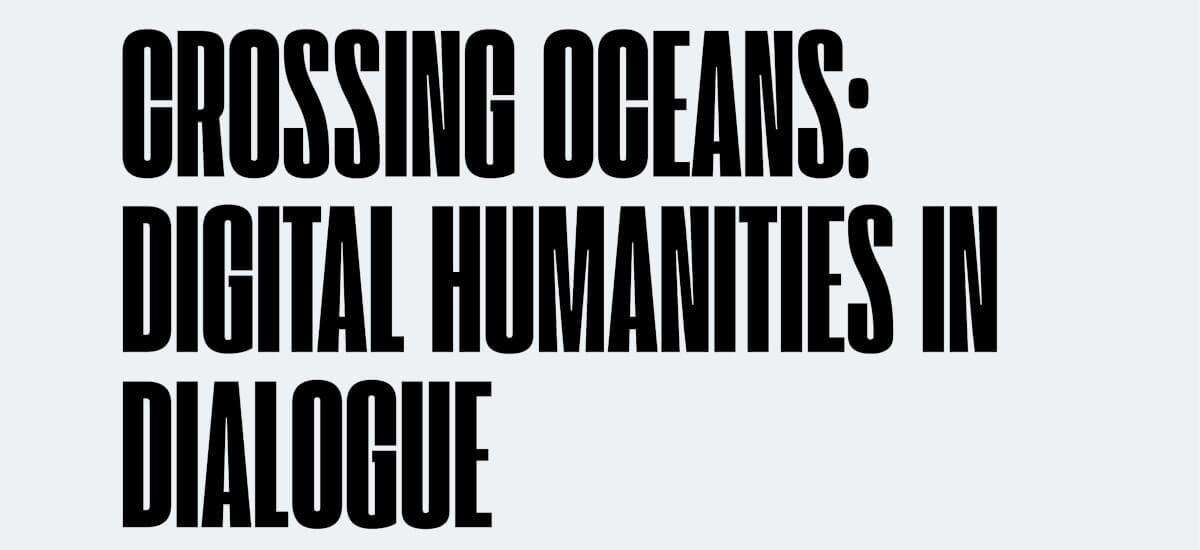
Detalhes do Evento
Conferência que tem como objectivo abrir espaço para o diálogo sobre como as Humanidades Digitais podem impulsionar abordagens plurais da história, da memória, do património e da criatividade.
Ver mais
Detalhes do Evento
Conferência que tem como objectivo abrir espaço para o diálogo sobre como as Humanidades Digitais podem impulsionar abordagens plurais da história, da memória, do património e da criatividade.
Crossing Oceans: Digital Humanities in Dialogue
We are pleased to announce the international conference Crossing Oceans: Digital Humanities in Dialogue, bringing together researchers, practitioners, and digital humanists from all around the globe. This event seeks to create a space of truly transoceanic dialogue to discuss the present and future of Digital Humanities.
The conference invites participants to rethink methodologies for work in the Humanities at a time when digital transformations are reshaping how we investigate, interpret, and share knowledge. The digitization of archival materials, alongside the proliferation of born-digital records, has multiplied the sources available for historical, literary, and cultural analysis. Today, researchers have at their disposal a wide range of digital tools and software that allow them to organise, interpret, manipulate, share, and store data in increasingly diverse ways, opening new pathways for both collaborative and innovative research. At the same time, the emergence of artificial intelligence challenges us to critically assess both the possibilities and the risks of automated tools in the construction of knowledge.
Programme highlights
26 February
08:30 GMT – Registration and welcome coffee
08:45 GMT – Opening
09:00–10:30 GMT – Digital archives and collections
10:30–12:00 GMT – Digital heritage
13:00–15:00 GMT – Round-table
15:00–15:30 GMT – Coffee break
15:30–17:00 GMT – Digital approaches to colonialism
17:00–18:30 GMT – Databases and archives
27 February
08:30 GMT – Welcome coffee
09:00–10:30 GMT – Artificial Intelligence
10:30–12:00 GMT – Databases
113:00–15:00 GMT – Round-table
15:00–15:30 – Coffee break
15:30–17:00 GMT – Infrastructures and methods
17:00–18:30 GMT – Artificial Intelligence
Call for papers
By crossing oceans and perspectives, this conference aims to open the space for dialogue on how Digital Humanities can boost plural approaches to history, memory, heritage, and creativity, while also confronting questions of accessibility, ethics, and epistemic justice, as when we use these tools to give voice to new agents previously made invisible by traditional historiography, for instance.
On this conference, we welcome contributions on topics including but not limited to:
- Methodological innovations in Digital Humanities research.
- The impact of AI on the Humanities and critical approaches to its use.
- Digitization projects and the challenges of working with born-digital materials.
- Digital strategies for reaching non-academic audiences.
- Tools and projects that facilitate collaborative and transnational projects.
Submission period: 20 October – 5 December 2025 26 January 2026 [new deadline]
Participation: Free of charge, registration required
Language: English (presentations in other languages may be considered)
🔗 Registration and proposal submission
Organisation
Organising Committee
Anderson Antunes (University of Évora / IHC / IN2PAST)
Sara Albuquerque (University of Évora / IHC / IN2PAST)
Scientific Committee
Ana Margarida Dias da Silva (University of Coimbra / CHSC / DCV-UC)
Anderson Antunes (University of Évora / IHC / IN2PAST)
Daniel Alves (IHC — NOVA FCSH / IN2PAST)
Santiago Perez (CEComp — FLUL)
Sara Albuquerque (University of Évora / IHC / IN2PAST)
Silvia Valencich Frota (CEComp — FLUL)
Executive Committee
Anderson Antunes (University of Évora / IHC / IN2PAST)
Diana Barbosa (IHC — NOVA FCSH / IN2PAST)
Sara Albuquerque (University of Évora / IHC / IN2PAST)
Paula Gentil Santos (University of Évora)
This conference is inspired by the KNOW.AFRICA project (https://doi.org/10.54499/2022.01599.PTDC), which investigates nineteenth-century Portuguese scientific expeditions in Angola by highlighting the invisible contributions of local agents who made travelling and collecting possible. In this project, we analyse how cooks, guides, interpreters, porters, local rulers, and others, collaborated with the construction of knowledge and the formation of scientific collections. Through the use of Digital Humanities methods and tools – such as GIS mapping, network analysis and visualisation, databases, and interactive digital timelines – KNOW.AFRICA aims to explore how digital tools can assist in the construction and dissemination of historical knowledge. By combining archival research with digital tools, the project not only advances academic debates on colonial science but also develops outputs aimed at wider publics, including digital exhibitions, podcasts, and interactive maps and timelines. In this way, KNOW.AFRICA aims to use the Digital Humanities as a way to bridge research and dissemination, turning historical inquiry into a shared, multidisciplinary and collaborative process.
Tempo
26 (Quinta-feira) 8:30 am - 27 (Sexta-feira) 6:30 pm
Organizador
Instituto de História Contemporânea — Universidade de Évoracehfc@uevora.pt Largo dos Colegiais, 2 — 7000-812 Évora
Publicações

Recensão a ‘Women’s History at the Cutting Edge’
Recensão crítica de Giulia Strippoli ao livro Women’s History at the Cutting Edge, editado por Teresa Bertilotti, sobre história das mulheres.

Recensão a ‘Subterranean Fanon’
Recensão crítica de Manuela Ribeiro Sanches à obra Subterranean Fanon, escrita por Gavin Arnall, sobre Frantz Fanon.

A propósito dos debates sobre o populismo
Artigo de Fernando Dores Costa, publicado na revista Práticas da História, que analisa o fenómeno do populismo.

Administrar para manter o regime
Capítulo da Ana Carina Azevedo, incluído no livro Construção do Estado, Movimentos Sociais e Economia Política, sobre a reforma da administração pública.

A era dos congressos
Capítulo de Joana Dias Pereira, incluído no livro Construção do Estado, Movimentos Sociais e Economia Política, sobre o movimento associativo no liberalismo.

Construção do Estado, Movimentos Sociais e Economia Política
Livro coordenado por Joana Dias Pereira et al. sobre os processos de construção do Estado Contemporâneo e a sua articulação com os movimentos sociais.
Pesquisa
Notícias
Novos órgãos sociais do IN2PAST
13 Fev 2026
Após eleições a 15 de Dezembro de 2025, tomaram posse os novos órgão sociais para o mandato 2026-2028
Víctor Barros e Pedro Cardim coordenam programa ‘Crioulidades e o Atlântico’
6 Fev 2026
Candidaturas a decorrer até ao dia 16 de Fevereiro
Ana Cristina Martins na Academia Internacional da Cultura Portuguesa
26 Jan 2026
Vai tomar posse como como Académica de Número
Oportunidades
Bolsa de Investigação Pós-Doutoral — CATTLE IN MOTION
18 Fev
Prazo: 18 Fevereiro 2026



